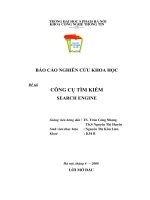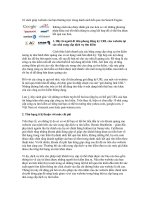Search engine myths exposed
Bạn đang xem bản rút gọn của tài liệu. Xem và tải ngay bản đầy đủ của tài liệu tại đây (2.38 MB, 49 trang )
Jonathan Leger
www.SearchEngineMythsExposed.com
Table of Contents
Why I wrote this report .......................................................................
3
Myth #1: Google Knows All and Sees All ...............................................
5
Myth #2: Google Will Not Rank Duplicate Content .................................
6
Myth #3: You Must Get Links From Related Subject Sites to Rank ...........
15
Myth #4: Your Site Must Focus On One Subject To Rank ........................
20
Myth #5: High PageRank Means Good Rankings .....................................
24
Myth #6: To Maintain Good Rankings, You Must Add New Content ..........
31
Myth #7: The Biggest Myth: Ranking in Google is Hard ...........................
34
A Case Study On Ranking in Google .......................................................
41
The Easiest Way To Rank In Google .......................................................
47
Earn $2,525 by giving away this report! .................................................
48
About the Author ..................................................................................
49
© 2008 SearchEngineMythsExposed.com | Page 2
Why I wrote this report
I’m going to keep each section of this report as short as possible. If you’re like me,
you’re busy, and you don’t want to spend the next week trying to suffer through 300
pages of e-bloat in the hopes that you get a few nuggets of wisdom that you can really
use. This report is only as large as it is because of all the screenshots from Google,
Yahoo and other sites I’ve included so you can see the facts for yourself.
With that in mind, feel free to skip this section.
However, if you’ve been struggling to rank in Google, reading the next few paragraphs
will help you to see that I was in your shoes once, too. That I got frustrated too,
before finally seeing the light and cutting through all of the baloney.
I wrote this report because I used to think that ranking in Google was hard. I thought
it was hard because I was listening to all the “gurus” who talked about ridiculous things
like meta tags, keyword density and PageRank. I listened to them, used the methods
they were hawking, and failed miserably.
So I turned instead to the search engine optimization (SEO) forums to see if what they
had to say was any better than the “gurus” who had taken my money. I read the posts
of the “forum gods” that everybody bowed to, listening and trying to replicate their
methods for ranking, only to meet with more failure.
In desperation I took the few things that I had found to be true and worked on them,
ignoring all of the conventional “wisdom” that is still being spread all over the web
about how to rank in Google. No matter how much the nay-sayers protested, if I saw it
was working I kept at it.
And you know what? Only then did I start seeing real results.
I was floored. Had the “gurus” been lying on purpose to keep me from ranking? Were
the “forum gods” doing the same, trying to stifle competition by spreading false
information? The conspiracy-theories going through my head didn’t last long, because I
had an epiphany about what was going on.
The “gurus” and SEO “forum gods” were repeating what they had heard, not
what they themselves were doing. How do I know this? Because none of the
bogus advice was backed up with facts, proofs and examples. It was just empty words
promising the world if you “did this” or “did that.” The nay-sayers were doing the
opposite, saying “this” or “that” wouldn’t work because they didn’t think it would, not
because they could prove that it wasn’t working for themselves or others.
© 2008 SearchEngineMythsExposed.com | Page 3
The “forum gods” could be forgiven, since they were just hanging out with nothing
better to do then spread their “wisdom” (I often wondered if any of them had jobs, or
were still living at home with their parents. They seemed to have an awful lot of time
to post on forums.)
The “gurus”, however, were more reprehensible. They were selling bogus
information without checking it out first. If they had done the research ahead of
time, then they would have quickly seen that it was false. Apparently they were so
busy taking peoples’ money and cashing their checks that they didn’t have time to
actually verify the methods they were hawking.
Now, much of what the “gurus” are selling perhaps used to be true, before Google
came on the scene and obliterated the competition. Things have changed dramatically,
and yet the information being hawked is almost exactly the same.
That’s why I decided to write this report. It’s time to dispel the myths, get out of the
90’s and start proving the facts that work now. It’s time for you to stop paying the
“gurus” that aren’t proving that their methods work.
Okay, that’s enough of that. Now let’s get into it.
© 2008 SearchEngineMythsExposed.com | Page 4
Myth #1:
Google Knows All and Sees All
This myth really burns me up. Try this: post anything that goes against conventional
Google-ranking wisdom to an SEO forum (no matter how successful you’ve been with
it) and watch dozens or hundreds of people flail you about how wrong you are and how
Google ‘surely knows how to negate that method.’
Will they offer proof of their nay-saying? No. They just have blind faith in Google’s
ability to know all and see all.
Blind faith is the only phrase I can use for this thinking, because it’s not based on
reason or proof. The conventional SEO wisdom teaches simply that Google is a deity
which knows all and sees all.
But what is Google, really? Google is an algorithm. And who created the algorithm?
People created Google’s algorithm. (Sorry nay-sayers, Google was not handed the
algorithm from the Divine.)
Yes, people wrote Google’s algorithm. Are people perfect? No. Then can Google’s
algorithm be perfect? No. Do people know all and see all? No. Then can Google’s
algorithm know all and see all? No!
In fact, it never ceases to amaze me what Google doesn’t see. One forum that seems
to be more honest than the rest is WebMasterWorld.com. I think it attracts a higher
caliber of posters because it doesn’t allow signatures. The people there are actually
there to share information, and not try to pitch or sell you on something.
WMW has a forum dedicated to Google’s search engine, and I’ve been reading through
it for a couple of years now. It never ceases to amaze me how many complaints I read
about how badly Google is performing in a variety of sectors and keywords. How the
sites ranking in the top 10 are all spam or Made For Adsense (MFA) sites. These
posters complain that they continually notify Google of the problem, and yet the sites
remain in their top-ranking positions.
Now does that sound like the work of a Deity? It doesn’t, does it. It sounds (*gasp*
dare I say it?) like the work of people.
Yes, Myth #1, that Google knows all and sees all, is undeniably false.
So stop being afraid of Google. Now let’s get into a few specific myths surrounding
how Google responds to a variety of methods and tactics, starting with Duplicate
Content.
© 2008 SearchEngineMythsExposed.com | Page 5
Myth #2:
Google Will Not Rank Duplicate Content
If you’re worried that using duplicate content is going to somehow get your site
penalized, deindexed, or otherwise make your site fall out of favor with Google, stop
worrying:
/>The above post is from Google’s official blog. Notice the second bulleted point,
underlined in red. Google says quite plainly that duplicate content won’t hurt your site.
© 2008 SearchEngineMythsExposed.com | Page 6
But is it possible for duplicate content to rank well? Absolutely. Let’s talk about that.
Click this link and take a look at all of the duplicate content that appears in Google’s
results:
/>se+Content%22&btnG=Search
That link will search Google for the title (in quotes) of a blog post that I wrote and later
submitted to EzineArticles.com quite some time ago. There are currently 315 copies of
the article published in Google:
Now, if Google filters duplicate content, why is it that 315 results are shown, and not
just one? Ever think about that?
You might say, “Yeah, but you put the title in quotes. That makes a difference.”
Okay, here’s the link to the title without quotes:
/>Content&btnG=Search
© 2008 SearchEngineMythsExposed.com | Page 7
The top 10 results are very similar, with or without quotes!
What does that mean? It means that Google is not filtering the duplicates!
“That’s because it’s such a long query,” you say? Then let’s shorten it. Let’s search
Google only for “Motivated to Create Content”:
/>h
© 2008 SearchEngineMythsExposed.com | Page 8
Oh look! The top 2 results are still duplicate copies of my article!
Or how about “New AdSense Content” (with quotes)?
As of right now, six of the top 10 results are still for duplicate copies of my article
(including the number two spot, shown above).
What does all of this mean? It means that Google will rank a duplicate copy of an
article. After all, that article originally appeared on my blog, and yet my blog post is
not in the top 10 for any of the search queries I've shown!
Does that mean that you can just run out and publish thousands of private label rights
(PLR) articles, or articles from free article sites and get a flood of traffic from Google?
No, that’s not what it means.
Why not? In Google’s own blog post shown at the beginning of this section, Google’s
representative said that “Google wants to serve up unique results and does a great job
of picking a version of your content to show.”
Let’s break this statement down into its two parts:
1. Google wants to serve up unique results.
It’s Google’s goal to only show one copy of any particular article or page in the search
results for a given query. Having ten duplicate results of the same article for a query
doesn’t help the person performing the search nearly as much as having ten unique
articles for the searcher to choose from.
© 2008 SearchEngineMythsExposed.com | Page 9
In another blog post Google makes this reason very clear:
“Our users typically want to see a diverse cross-section of unique content
when they do searches. In contrast, they're understandably annoyed
when they see substantially the same content within a set of search
results.”
/>That leads us to the second part of Google’s own statement:
2. [Google] does a great job of picking a version of your content to show.
Ah, yes. Google picks a version of the duplicate content to display. What do they base
that selection on?
Primarily two things: links to the page and the title tag.
You see, when you search for a set of keywords (in this case an article title), Google
will first check to see if any pages in their index have links aiming at it containing the
search query.
So when you search for “Get Motivated to Create New AdSense Content”, Google will
first check the links going into the pages to see if they contain that exact phrase (or
important parts of it).
Now, almost no pages are going to have many (if any) links with that really long phrase
in the anchor text. So Google then has to default to looking for pages whose title alone
matches the query.
That’s why all of the duplicates show up in the results when you search for “Get
Motivated to Create New AdSense Content” – Google is relying on the title tag to find
matching results due to a lack of related links.
However, the shorter our query gets, the more pages Google will find whose in-bound
links do match the search query. Now Google’s hands are untied: it can start showing
other results, and pick only the “best” version of the duplicate content to display. And
what determines what the “best” version is? The links aimed at the page, of course!
Did you notice that the same result was #1 for “Motivated to Create Content” and #2
for “New AdSense Content” in Google? That’s because it actually had some links aimed
at it from other sites that included the keywords.
© 2008 SearchEngineMythsExposed.com | Page 10
(I’ll be using Yahoo to demonstrate link quantity, since Google’s link: command shows
very, very few of the links actually aimed at a page in order to prevent – I believe –
precisely this kind of analysis.)
Since the competition isn’t fierce for the keywords I used, it only took 20 links for this
piece of duplicate content to get ranked. My point is, though, that it still ranked. It
was not filtered, despite being a duplicate copy of an article that was not published on
that site before any other.
That’s important, too, so let me repeat it:
Google does not always rank the site that originally published the article.
Google shows the page that has the most linking power for the query.
Like I said before, the article I’m using as an example was published first on my own
blog, and then submitted to EzineArticles.com. My blog isn’t anywhere in the top ten
for any of the queries shown here.
Why not? Because I wrote the blog post for my email list. I wrote it, emailed my list
about it, and that was it. I didn’t optimize my page at all. No optimization means no
ranking!
“But maybe your blog post just wasn’t indexed first?” you say.
© 2008 SearchEngineMythsExposed.com | Page 11
Let’s think about that. Maybe it wasn’t indexed first. But EzineArticles.com’s copy was
indexed overnight after being published, and yet EzineArticles’ copy of the article does
not rank #1! Why not?
It’s indexed in Yahoo:
But Yahoo says there aren’t any links aimed at it:
It doesn’t matter if the page was published first on EzineArticles if there aren’t any links
aimed at that page. That’s another pile of baloney myth that is spread all over the
web. The “gurus” claim that the page indexed first wins. That’s not true at all (as
demonstrated here). The page with the most links wins!
© 2008 SearchEngineMythsExposed.com | Page 12
While not wanting to come right out and say it, Google gives a strong hint that this is
true in a blog post about duplicate content:
“Syndicate carefully: If you syndicate your content on other sites, make
sure they include a link back to the original article on each
syndicated article. Even with that, note that we'll always show the
(unblocked) version we think is most appropriate for users in each given
search, which may or may not be the version you'd prefer.” (emphasis
mine)
/>Why would Google want you to make sure a link back to the original article is included
in the syndicated copy? Quite obviously this helps to ensure that there are more links
to the original article, helping it to rank better than the duplicates.
In another post from that same blog, Google also makes it clear that your original
article may not be the one to rank:
“Q: I've syndicated my content to many affiliates and now some of those
sites are ranking for this content rather than my site. What can I do?
If you've freely distributed your content, you may need to enhance and
expand the content on your site to make it unique.”
/>The bottom line is: if you want duplicate content to rank, you need to get links
containing the search keywords you want to rank for aimed at your copy of the article.
The more competition there is, the harder it is to rank a duplicate page (because
remember, Google wants to show 100% unique results if it can).
Your copy has to be the copy with the most relevant links in order to rank for a given
search query.
That’s a compelling reason to have unique content: the competition for ranking is less
fierce. Think about it: If you have a page of unique content, and your page is just a
little less optimized than another unique page optimized for the same keywords, your
page may rank #2, just under the better-optimized page at #1. That’s still great!
© 2008 SearchEngineMythsExposed.com | Page 13
However, if you have a page of duplicate content, and your page is just a little less
optimized than another page of duplicate content for the same keywords, the betteroptimized page will rank well, but your page won’t be in Google’s results at all for those
keywords. That’s because Google selects the best duplicate page to rank for a given
query, and leaves the others out completely unless there’s just not anything else unique
to display that matches the query.
All that said, just because it’s harder to rank duplicate content does not mean Google
won’t do it. They make it clear on their own blog that this can and will happen if the
original article is not well optimized but a duplicate copy is.
Myth #2, that Google will not rank duplicate content, is undeniably false.
© 2008 SearchEngineMythsExposed.com | Page 14
Myth #3:
You Must Get Links From Related Subject Sites to Rank
I’m more inclined to be understanding of people who believe that this myth is true than
most of the other myths, simply because it does seem like it would be true. It seems
like Google’s algorithm would be advanced enough to give more value to links from
pages that are related to the subject matter of your own page.
Does Google do this? Does its algorithm give these related-subject links (known in the
SEO world as “themed links”) more value?
I’ll be honest: I don’t know if themed links are more valuable to Google.
The reason I don’t know is because it is so difficult to get themed links for niche sites,
and I deal almost exclusively with niche sites. Finding hundreds of places where you
can get a one-way link for a bonsai tree or deep sea fishing site is no easy task!
Even if you can find enough potential places to get a link in niche subject areas, there’s
no guarantee that the webmasters are willing to sell (or trade) links with you. Besides,
I don’t trade links, because my research shows that reciprocal linking just doesn’t have
a lot of link power with Google anymore. One-way links help you out in Google much
more (as do links that appear to be one-way – more on that later).
Because of this problem, I am forced to get links from sites that have little or nothing to
do with the subject matter of my own niche sites. But you know what?
Despite the fact that links to my sites are completely off-theme, my sites still
rank wonderfully well in Google!
I’ll be giving you an example of one of my own sites shortly, but first I’m going to show
you a site that ranks really well for very competitive keywords that does not rely on
themed links for its ranking in Google.
The site is submitexpress.com. As of today, January 9, 2008, SubmitExpress ranks #4
in Google for the phrase “search engine optimization.” Talk about a competitive set of
keywords! All of the top SEO gurus are working hard to rank well for that phrase.
That’s a real feather in the cap for the guys who do SEO for a living.
Here’s a screenshot of the current Google rankings:
© 2008 SearchEngineMythsExposed.com | Page 15
SubmitExpress has maintained a great ranking for those keywords for at least the past
6 months, because I wrote a blog post related to this subject on June 27, and
submitexpress.com was #3 back then.
(Boy, did the nay-sayers have a field day with that post! Of course, not a single one of
them proved me wrong. My favorite one is from a well-known SEO group that started
off their “rebuttal” with the fact that there are exceptions to every rule. My whole point
is that if the “rule” has such huge, glaring, undeniable “exceptions”, it’s no rule at
all!
Okay, moving on…)
So what kind of pages are linking to submitexpress.com? Are they related to SEO, or
even general webmaster topics? Very few of them are!
© 2008 SearchEngineMythsExposed.com | Page 16
To demonstrate this to you, I wrote a script that extracts the primary keywords in the
page titles of the 1,000 backlinks reported by Yahoo. I wanted to see just how many of
the first 1,000 links reported actually had anything to do with search engine
optimization. Here’s a list of the top keywords appearing in the page titles, along with
the number of times the keywords appeared in the linking page titles.
real estate => 81
county real => 25
search engine => 11
oregon real estate => 8
beach real estate => 8
web hosting => 6
web site => 6
soy candles => 5
digital camera => 5
civil war => 4
goat milk => 4
palm beach => 3
fairy wings => 3
promotional products => 3
labrador retriever => 3
acupuncture needles => 3
myrtle beach => 3
karo hali => 3
comforter sets => 3
business opportunity => 3
fund raising => 3
Yes, 23 of the 190 occurances shown here do have something to do with search
engines or web sites.
“That’s 12%,” you say? Not quite. This list is not exhaustive. The entire list consists of
750 keyword occurrences (most of which are completely unrelated). That means that
only 3% of the links to submitexpress.com (at least in the 1,000 samples provided by
Yahoo) actually come from pages that have anything to do with search engines or web
sites.
That leaves 97% that come from completely off-theme pages (as you can see from the
list above). There’s no reason to believe that the rest of this site’s links don’t fall into a
similar pattern.
That means that submitexpress.com has achieved the vast majority of its link power,
the link power that has it ranked #4 for an incredibly competitive set of keywords, from
off-theme links.
© 2008 SearchEngineMythsExposed.com | Page 17
Shocking? Not to me! My sites have been ranking from off-theme links for a long time.
Now that you can see that sites can rank really well for really competitive keywords
with off-theme links, let me show you an example that’s a bit more down to earth. This
is an example of one of my own sites, ArticleBuilder.net. Here’s a snapshot of its
current Google ranking for the phrase “free web content”:
It’s currently #5, but it’s ranking ranges from #3 to #7 (Google shifts things up a bit
from time to time). It’s always well positioned on page one, though.
Pay a visit to Yahoo’s site explorer to see how completely off-theme the links are to
this site:
/>er.net&bwm=i&bwmo=d&bwmf=u
© 2008 SearchEngineMythsExposed.com | Page 18
The pages linking to it range in subject matter from building custom furniture to lasik
eye surgery to alcoholism treatment and so forth. Virtually none of the pages have
anything to do with “free web content.”
And yet my site has been enjoying page one ranking (and traffic) for close to a year
now.
A kind of funny proof that links don’t have to be on-theme can be seen in Google’s
results for the phrase “click here”:
Seriously, do you think that the links aimed at these sites are from pages or sites
related to “click here”? Or is it just that the links contain the phrase “click here.” The
answer is obvious.
Need I say more?
Myth #3, that you must get “themed links” to rank well, is undeniably false.
© 2008 SearchEngineMythsExposed.com | Page 19
Myth #4:
Your Site Must Focus On One Subject To Rank
Accepted SEO “wisdom” states that your site needs to contain information that is all
related to each other in order to rank well. Having a “themed site”, as they call it, is
the only way to win Google’s love. This is pure mythology. Let me give you an
example:
© 2008 SearchEngineMythsExposed.com | Page 20
I have a blog (hotnewsitems.blogspot.com) that has an archive page which ranks #8
for the phrase “zoon mp3 reviews”.
In case you aren’t aware, Zoon is a brand of mp3 player. Is that blog about mp3
players, or music, or even electronics in general? No, it’s a general news blog that was
part of a case study I was doing.
In fact, there’s only one post on the site that has anything to do with mp3
players, and that’s the post that is generating the ranking in Google!
So how is it that my blog ranks so well for that query? Links, of course!
The blog is too new for the backlinks to be showing in Yahoo!, so I can’t give you a
screenshot of the links here. I can tell you, though, that I submitted that post to about
70 social bookmarking sites, so it has quite a few links aimed at it (from completely offtheme sites, too, by the way).
Does your site have to be all on the same theme to rank well in Google? My blog
ranking for an mp3-player set of keywords sure screams No!
Let me give you another great example that proves this notion of themed content to be
complete mythology.
Did you know that the US Social Security Administration has a section of its site devoted
to popular baby names? It does!
/>According to Google, ssa.gov has about 90 pages devoted to the topic of baby names:
What percentage of the SSA’s total content is that? Well, according to Google, ssa.gov
is made up of about 20,000 pages:
© 2008 SearchEngineMythsExposed.com | Page 21
That means that less than 1/2 of 1% of the pages of the SSA’s site are devoted to baby
names. If you believed conventional SEO “wisdom”, that means that there’s no way the
SSA’s baby names section could rank well for the phrase “baby names” – after all, those
pages are completely unrelated to the theme of the rest of the site.
I’m afraid Google disagrees:
© 2008 SearchEngineMythsExposed.com | Page 22
With more than 12 million competing pages, this government web site with only a tiny
fraction of its pages devoted to the topic of “baby names” is ranking #4 in Google for
the keywords.
Need I say more?
Myth #4, that your site must focus on one subject, is undeniably false.
© 2008 SearchEngineMythsExposed.com | Page 23
Myth #5:
High PageRank Means Good Rankings
In case you’re not familiar with PageRank, it’s merely a number from 0 to 10 that
indicates the link popularity of a page in Google’s index. So, basically, the more links a
page has, the higher its PageRank will be. It’s not quite that simple, since the
PageRank of the linking pages also effects the PageRank of the linked page (that is, one
page can “pass” PageRank to another). I’ve seen the formula Google uses to calculate
PageRank, and it’s pretty daunting. Fortunately, it’s also unimportant.
PageRank is the currency of link buyers and sellers, to be sure. The higher the
PageRank of a page, the more it will cost to buy a link there – period. People pay a
premium for PageRank because of the ever-present myth that having a high PageRank
will help your site rank better. Untold millions of dollars are wasted on purchasing links
at exorbitant prices because the pages where the links will appear have a high
PageRank value.
The reason why this myth persists is that it appears to be true. Many top ranking sites
do have a high PageRank, and therefore the connection is often made that their ranking
is because of their PageRank.
To demonstrate this, I ran 500 very competitive keywords through Google and checked
the PageRank of each of the top 10 ranking sites for each set of keywords.
Here's the average PageRank for the top 10 ranking sites across the board:
1. 6.722
2. 6.866
3. 6.292
4. 6.234
5. 5.968
6. 5.88
7. 5.73
8. 5.662
9. 5.656
10. 5.604
Now, just looking at the averages, you might say, "wow, I guess high PageRank sites
do rank better!" And you wouldn't be entirely wrong for saying that. Yes, overall, sites
with higher PageRank are ranking better in Google.
But the question is: is it the PageRank that's causing the high ranking, or is it
something else?
© 2008 SearchEngineMythsExposed.com | Page 24
Here is a list of the number of times for each ranking position that the ranking site has
a lower PageRank than the site beneath it in the results. For example, if a site with
PageRank 5 ranks #3 for a set of keywords, and the site ranking #4 has a PageRank
higher than 5, that adds one to #3 in this list.
1.
2.
3.
4.
5.
6.
7.
8.
9.
155
133
148
152
167
178
165
187
178
If you’re more visual, here’s a graph showing the percentages of lower PageRank sites
that outrank higher PageRank sites for a given search position:
So about one-third of the time sites are outranking other sites with higher PageRank,
demonstrating that higher PageRank doesn't always win.
© 2008 SearchEngineMythsExposed.com | Page 25









